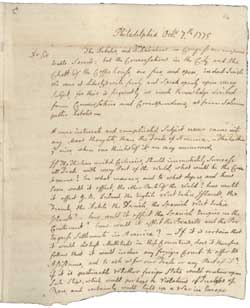Collections Online
Letter from John Adams to James Warren, 7 October 1775
To order an image, navigate to the full
display and click "request this image"
on the blue toolbar.
-
Choose an alternate description of this item written for these projects:
- Main description
[ This description is from the project: Coming of the American Revolution ]
In this letter to James Warren, president of the Massachusetts Provincial Congress, John Adams discusses the possible fates of colonial trade and foreign relations if independence were declared. Adams wonders to what extent foreign powers can be trusted to maintain beneficial trade agreements, discusses strategies for developing bonds without England's help, and proposes plans for the fortification of ports and rivers.
An "intricate and complicated subject"
After a flurry of activity in the summer of 1775, Congress takes a brief recess in August. When the body reconvenes in September, five men representing the entire colony of Georgia are present. Several questions continue to plague Congress. What will become of American trade and foreign relations if the colonies separate from Great Britain? Would foreign nations trade directly with the American colonies? Would any nations be open to diplomatic relations? In the fall of 1775, Congress attempts to answer some of these questions by establishing two committees to negotiate with foreign powers. The first (the Secret Committee) is responsible for acquiring military supplies from abroad, while the second (the Committee of Secret Correspondence) is created to communicate with allies in Great Britain and other parts of the world. Throughout the fall, John Adams shares his insight on these matters with James Warren, president of the Massachusetts Provincial Congress.
Questions to Consider
1. In the first paragraph, John Adams suggests that the proceedings of the Congress are a secret. Why do you think delegates would try to keep the proceedings a secret?

